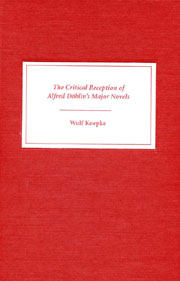Book contents
- Frontmatter
- Contents
- Preface
- Major Novels by Alfred Döblin
- Introduction
- Part One Contemporary Reviews
- Part Two Döblin Scholarship
- 3 Döblin Scholarship: The First Approaches
- 4 Die drei Sprünge des Wang-lun
- 5 Wadzeks Kampf mit der Dampfturbine
- 6 Wallenstein
- 7 Berge Meere und Giganten
- 8 Manas
- 9 Berlin Alexanderplatz
- 10 Babylonische Wandrung
- 11 Pardon wird nicht gegeben
- 12 Amazonas
- 13 November 1918
- 14 Hamlet oder Die lange Nacht nimmt ein Ende
- 15 Döblin's Impact on Other Writers
- Conclusion
- Bibliography
- Index
7 - Berge Meere und Giganten
from Part Two - Döblin Scholarship
Published online by Cambridge University Press: 05 February 2013
- Frontmatter
- Contents
- Preface
- Major Novels by Alfred Döblin
- Introduction
- Part One Contemporary Reviews
- Part Two Döblin Scholarship
- 3 Döblin Scholarship: The First Approaches
- 4 Die drei Sprünge des Wang-lun
- 5 Wadzeks Kampf mit der Dampfturbine
- 6 Wallenstein
- 7 Berge Meere und Giganten
- 8 Manas
- 9 Berlin Alexanderplatz
- 10 Babylonische Wandrung
- 11 Pardon wird nicht gegeben
- 12 Amazonas
- 13 November 1918
- 14 Hamlet oder Die lange Nacht nimmt ein Ende
- 15 Döblin's Impact on Other Writers
- Conclusion
- Bibliography
- Index
Summary
BERGE MEERE UND GIGANTEN, Döblin's immense vision of future history, impressed his contemporaries when it appeared in 1924, but seems to have embarrassed rather than fascinated academic scholars, who found ways to avoid it. Klaus Müller-Salget has noted that it is almost de rigueur to speak in negative terms about this work; and he mentions Muschg, Martini, and Leo Kreutzer as examples of this. Erwin Kobel, in a book dealing with Döblin's early short stories and all major novels, even Manas, avoids Berge Meere und Giganten as well as Wadzek. Ingrid Schuster's collection of essays of 1980, Zu Alfred Döblin, also omits it. Sebald dismisses the book simply as science fiction — meaning that he judges it worthless. But others who have confronted the monstrous text have felt compelled to dive into the intricacies of Döblin's philosophy of nature. Roland Links pursues Döblin's own (later) question as fundamental for the text: “Was wird aus dem Menschen, wenn er so weiterlebt?” (83). There is a close correlation between critics' avoidance of the issues of Döblin's philosophy of nature and their avoidance of Berge Meere und Giganten. Therefore, the amount of scholarly literature on this text is relatively small; yet as interest began to grow in Das Ich über der Natur and Unser Dasein, Berge Meere und Giganten seemed to deserve a second and third look.
- Type
- Chapter
- Information
- The Critical Reception of Alfred Döblin's Major Novels , pp. 115 - 122Publisher: Boydell & BrewerPrint publication year: 2003



